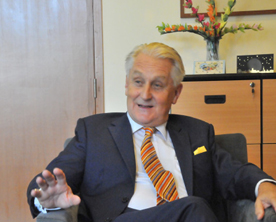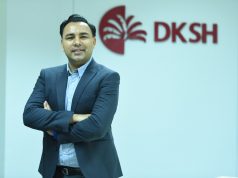Name: Christian-Ludwig Weber-Lortsch
Country: Germany
Job Title: Ambassador
Profession: Lawyer
MI: What is your mission in Myanmar?
CLwL: My main purpose is to reinforce the relationship between Germany and Myanmar in many areas. We are also trying to assist the Myanmar government to rebuild the country, through sharing our experience in the process of the unification of Germany. With the recent visit of his Excellency, the President of Germany, we want to bring back our historic ties in business, culture, education and development cooperation.
MI: How would you describe the relationship between Germany and Myanmar over the years?
CLwL: We celebrate 60 years of official diplomatic relations. Of course, there were ups and downs during these times. After Myanmar’s independence, Germany had a strong presence here. It was the biggest developing partner, after Japan. In the late 80s, due to the political situation in the country, our activities were somewhat reduced. Now we are back!
MI: Tell us one thing that surprised you when you first started your assignment in Myanmar.
CLwL: When I made my first visit, it was like a journey back in time: Poor phone and internet lines, no mobile roaming, daily power cuts, no ATMs, rattling old taxis without air con and wet seats during monsoon season! Many of these issues have been fixed. Luckily the old charm of Myanmar is still being kept. Friendly people who donate to monks every morning, it is still a very special place. Myanmar is more modern now, yet still keeping its old traditions. A good example would be the preservation of historic buildings. A team of research experts led by a German professor have just published the first Yangon Heritage map.
MI: Why would you encourage German companies to do business in or with Myanmar? What are the focus sectors/ industries that you would encourage German companies to invest in?
CLwL: First, we have to understand the definition of doing business; German companies can buy, sell or invest. All three have potential.
There is potential to buy textiles, agricultural products, seafood, etc. What Myanmar needs is assistance to meet EU-standards to facilitate the import of these goods.
Germany sells high class technology products. Myanmar is famous for its natural resources. German companies can play a role here by supplying equipment and tools to upgrade the technology of extracting and processing these raw materials.
Investment wise, German companies manufacture in Myanmar to sell locally, in the region or to re-export back to EU. There are many hidden champions in Germany: High tech SMEs that produce components for machinery, automotive, pharmaceutical, chemical industries and consumer goods. They can all play a part in business here.
MI: How many German companies have invested in Myanmar so far?
CLwL: There are more than 30 companies in various forms of investment engagements; such as textiles, ship management and training, detergent factory to name a few. Most are in partnership with locals and a pharmaceutical factory will begin production next year. German companies apply international technical and social standards.
MI: Germany as one of the world largest car producers in the world; we see many Mercedes Benz and BMWs while strolling in Yangon. How do you see the auto market development in Myanmar?
CLwL: I am proud that German high-end brands are here. I would love to see also more mid- market vehicles. For the development of an auto market, every country has to follow its own path. It is not easy to come into the auto manufacturer league. I think it is premature to assess Myanmar’s potential for building its own automotive industry. Currently the car market is mainly a pre-owned market. Of course, the number of cars on the road has gone up significantly. When I arrived two years ago, I used to go back home daily for lunch. Due to traffic this is no longer possible.
MI: Machinery – Germany is well known for its machines and engineering. As lots of infrastructure projects are coming up coupled with the government’s commitment to industrialization; how do you see German companies playing their part in these areas?
CLwL: Machinery is our biggest export line to Myanmar. We can play a significant role in this nation’s country technology upgrade. For building-up industries you need machines. With engineering, planning and high tech components, German companies contribute to modernizing and rebuilding the infrastructure.
MI: What about soft skill training in the relevant areas?
CLwL: There are two aspects to this. The first one is government to government training and development assistance. We fund a Vocational Training Institute that provides industrial training, under the auspices of Ministry of Industry. It is located near the city of Pyi. The second aspect is the in house training programs of our companies. In Germany we have a two-track vocational training system, which combines theoretical classroom teaching with practical in-company instruction.
MI: Are you satisfied with the current reform process? Which areas have exceeded your expectations and which areas have not?
CLwL: The Myanmar Government has initiated a comprehensive reform and modernization process. Today there are more than 60 political parties, 600 plus labor unions, censorship has been abolished. I admire and congratulate the Reform-Government for what has been achieved in such a short period of time. Now comes the heavy lifting part, such as constitutional reforms, the peace process, a possible move towards federalism and fair and transparent elections next year. The basic rule of democracy is peaceful transition of power, which will lead to confidence in the political system by international investors.
The country needs both, economic growth and a fair distribution of wealth and a reform of the educational system.
MI: Germany is the 2nd largest donor to Myanmar after Japan, I believe, what are the priorities of Germany government to assist the growth of this country?
CLwL: Our development cooperation concentrates on sustainable economic development. It is sub-divided into three different programs: vocational training, private sector development and financial advice.
For vocational training, we fund the institute as mentioned before and we also provide experts for the institute.
For private sector development, we provide general advice for example for the new SME (Small and Medium Enterprises) law. We also send experts to Taung Gyi, for practical development of SMEs to improve Agricultural products supply chain.
SMEs are the backbone of the German economy and they are the engine of job creation in Germany. Another element of our program is to improve access for SMEs to finance.
The assistance is provided by GIZ (German International Development Agency) and KfW Development bank.
MI: What are the main policies your Excellency expects to see in the near future to enhance Myanmar competitiveness in the region?
CLwL: Some business people complain about the infrastructure, legal system and bureaucracy. In Myanmar, one cannot run a factory or even an office without a generator set. And running a generator set increases costs for the industry. One cannot be competitive with that. In terms of bureaucracy there are still leftovers of the old days in the government machinery. For example, foreigners are not allowed to legally register a local mobile phone number here. Many regulations discriminate against foreigners and business. Investors need clear and transparent rules and regulations.
MI: From a country development standpoint, what do you see are the biggest challenges facing the current government in the next 1-3 years?
CLwL: The first challenge would be infrastructure. The Government is doing a lot, but decades of neglect cannot be fixed in a couple of years. The next one would be to further integrate the ethnic minorities. Peace is not everything, but without peace, everything is nothing. Armed conflicts block development and poverty alleviation. Myanmar is a rich country with a poor population.
MI: Some investors are adopting a wait and see attitude; investors are looking for long term stability after 2015. What are your Excellency’s thoughts on political stability of Myanmar after 2015?
CLwL: Investors should start to look for opportunities right now. Every business is different. In terms of political stability, I don’t advise companies to wait for the next elections.
My thoughts and wishes for the Myanmar future would be one of national reconciliation in politics and on the ground. The world is watching you: a successful reform process in Myanmar would set an important example for a peaceful change towards democracy and prosperity in the region and beyond.
MI: How do you see Myanmar comparing with its Asian neighbors in the short and long term future?
CLwL: If we go back in time to the late 1950s, Myanmar was one of the most developed countries in Asia, richer than Thailand, Korea or Singapore. Today, the map has changed. Some went up, others down. Success was mainly home-made. Hard work and education seem to be more important than natural resources. And history teaches us that isolation is a certain way to loose competitiveness and development.
Myanmar has all the potential to catch up with its more developed neighbors. But it will take time and full commitment of each and everybody. In the end, productivity is more important than the “unearned” income of fantastic property prices.
MI: What advice would you give a German company to consider before putting their money in Myanmar?
CLwL: Do not start with money. Doing business is not a donation. Test the market; look for a good partner with proven record of business and trust. Then, use your calculator!










